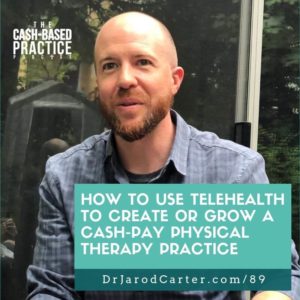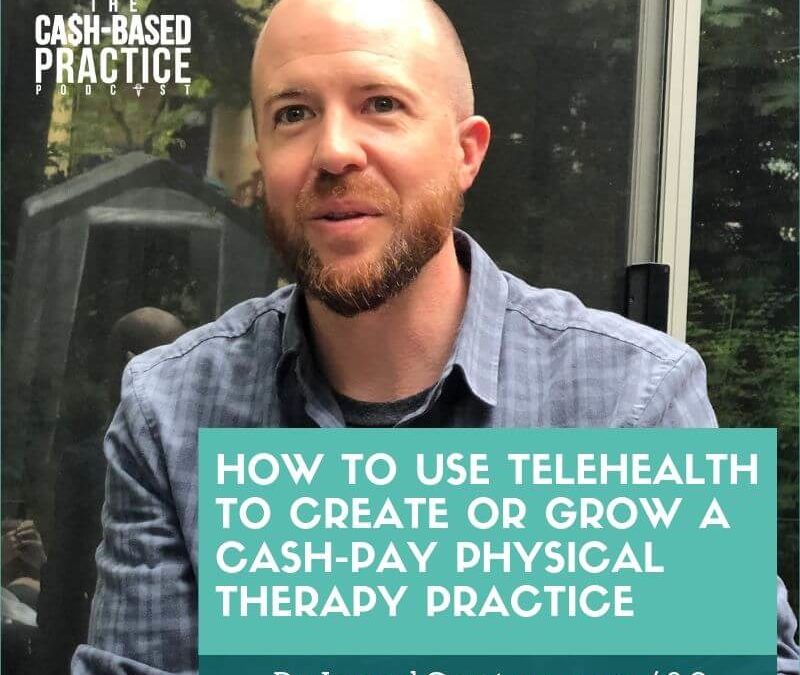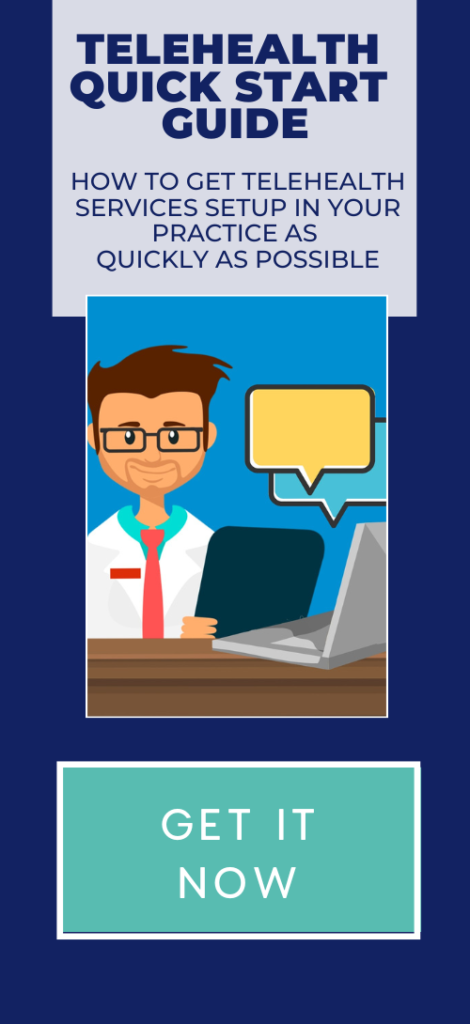 In 2005, Rob Vining developed and launched the world’s first digital practice for physical therapy. His telehealth model allowed him to accept and treat patients far and wide on a cash-pay basis, and it became clear those patients were getting great results. In time, Rob found himself focusing more on developing software tools that would enable medical professionals to easily enter the growing telehealth market. He and his students are proving the potential for PTs to become more efficient and profitable by making telehealth visits available for the convenience of existing patients as well as by reaching the large number of potential customers who are unable or unwilling to pursue in-person PT.
In 2005, Rob Vining developed and launched the world’s first digital practice for physical therapy. His telehealth model allowed him to accept and treat patients far and wide on a cash-pay basis, and it became clear those patients were getting great results. In time, Rob found himself focusing more on developing software tools that would enable medical professionals to easily enter the growing telehealth market. He and his students are proving the potential for PTs to become more efficient and profitable by making telehealth visits available for the convenience of existing patients as well as by reaching the large number of potential customers who are unable or unwilling to pursue in-person PT.
In this interview, Rob explains how telehealth visits work in terms of effectiveness, technology, workflow, marketing and conversions, and legal issues … And he also explains something I didn’t realize was possible: how a telehealth component added to your website can massively increase in-clinic/local leads for your brick-and-mortar practice!
He shares details about how software tools make such visits easy to implement and relatively low cost for those considering a jump into private practice. His approaches for marketing, including a highly effective strategy for lead generation, offer any practice an opportunity to create new sources of revenue with little risk. And finally, he offers a very-encouraging update on legislation that may soon bring telehealth into the mainstream in terms of Medicare and insurance acceptance.
More specifically, we discuss these cash-based practice topics:
- How software can allow PTs to provide HIPAA-compliant telehealth consults.
- How telehealth offers the lowest-risk option of starting a new cash-based practice.
- The strategy he used to get gym owners to eagerly refer him to their members.
- Using telehealth as an effective approach to treating patients who simply don’t have the time for traditional PT visits.
- My “manual therapist objection” to the idea of not being able to touch my patients, and why telehealth can even be a lucrative and effective addition to a manual therapy practice like mine.
- How telehealth can allow your practice to serve an entirely different group of potential patients.
- The importance of requiring advance payment for consults and how refunding those payments when they are not a good fit for telehealth creates more marketing opportunities.
- Adding telehealth capability as an adjunct to traditional physical therapy can allow you to serve a much broader audience and improve your marketing efforts and bottom line.
- Shipping light, low-cost exercise equipment/supplies to patients’ homes helps keep patients compliant and generates enthusiastic word of mouth marketing buzz for your practice.
- The legalities of telehealth related to licensing, PT Compact, some recent laws enacted for Delaware and Texas, informed consent, getting permission to record video consults, HIPAA.
- An online physical therapist chat service that provides brief initial consults via your website (for free) in order to attract and convert leads to your brick-and-mortar cash practice.
- How to target niche markets with videos to generate leads and networking opportunities.
- The key components of a “hook” that will quickly convert leads into paying customers.
- How an inexpensive ad campaign that refers to a free chat visit with an expert will reliably convert contacts into paying patients.
- Using telehealth as a lead generator for traditional physical therapy.
- The Telehealth 10K promotional contest: every entrant gains immediate access to a large library of telehealth educational content and one winner gets $10,000.
- News on the increasing acceptance of telehealth within the category of physical therapy.
Resources mentioned in this episode:
- www.PTlive.me
- www.Digital.physio
- www.TelehealthPT.com
- www.YouTube.com/telehealth20 or www.SoundCloud.com/telehealth20
- Facebook PT group at www.fb.com/groups/telehealthpts
- Cliniko Allied Health Practice Management Software
- Zoom for healthcare
- https://doxy.me
- Pocketdoc
- Zapier
Interested in the cash-based private practice model?
>> Click Here to learn how to start your own Cash-Based Practice <<
Let us know if you enjoyed the show:
[Click to Tweet] Thanks Rob Vining @PTliveguy for all the online and in-person marketing tips on the Cash-Based Practice Podcast w/ @drjarodcarter ! https://drjarodcarter.com/89 #cashPT







Great info, very helpful. I have been playing w the idea of telehealth for my cash based practice this year but feel overwhelmed w tech side of it… this was helpful though I have a lot to learn…
Thanks for the comment… I think one of the many great things Rob has done here is to make the tech side of it much less daunting. Hope you can give it a try!!
Very glad you found the conversation helpful! We should be releasing the video library on December 1st after the Telehealth $10K competition and that should help folks see different angles of treatment and business opportunities and hopefully it will give folks the confidence to hop into the 2nd round of the $10K challenge where the tech side / marketing side and treatment sides are all covered! Hope you keep pushing forward and implement Telehealth Alina! You can do it!
I found this telehealth episode interesting as I have created, built and operate the first and original 100% mobile studio PT business. This is the 4th year of this practice model and I am in a transition stage to incorporate a cash tele-wellness model. I gathered useful information from Rob and think he’s doing great things for the future of PT. I would hope for our great PT innovators to participate as APTA members to promote growth for the profession regardless of their hands on involvement. We have so many states that are pursuing telehealth for PT and can use heavy hitters who are PT entrepreneurs like Rob to aid in their platform.
Thanks Matthew! Just curious about the details of your “mobile studio PT business”.. tell us more!
Hey Jarod.
I appreciate what you do for our profession and motivating many to proceed with their dreams to be their own boss.
My studio is basically a PT room on wheels to reduce stresses and inconveniences of time and commuting constraints for patients and clients . From a clinician’s perspective their is greater access to clinical equipment with less physical stress of carrying equipment. Less distractions and greater client privacy without leaving their business, corporate or residential location.
Ahhhh I knew there were lots of mobile practitioners but now I see what you meant by mobile “studio” … sounds like a fun podcast episode 🙂 You interested?
And thanks for the kind words!
Thanks for the invite Jarod. Yes I am interested. Maybe we can coordinate time to talk about preliminary details.
Can you email me ?
Hi Matthew, I’m currently assisting the APTA with a couple different Telehealth related projects (advocacy and education) and I think our profession has plenty of potential. Glad you found the episode useful!
Thanks for responding and what you do for telehealth Rob.
We’ve had an up hill challenge to achieve a level of autonomy that matches the comprehensive complexity of our professional curriculum ie DPT. Unfortunately we have a lot of division and lack of cohesiveness in our profession. I believe this divide challenges our ability to grow faster towards achieving an unlimited and true direct access model nationwide. I think it’ll be a great advantage to have our greatest innovators, pioneers, leaders, clinical masters, and entrepreneurs to come together on the same platform to achieve these goals.
I fear that our lack of combining our resources on the same platform breaks opportunities for cohesive future growth of the profession.
I’ve had reservations about contributing to the APTA but this currently is the ownly national platform for advocating our profession.
I’m interested in hearing your thoughts. What concerns have discouraged you from being an APTA member?
I have read about their efforts to push for telehealth both nationally and in my state of Florida.
What progress are they making in the future of telehealth for our profession to be recognized by insurances?
Thanks for your time.